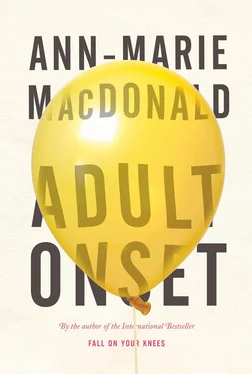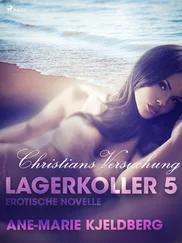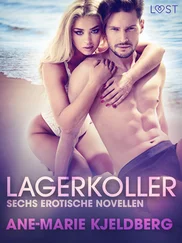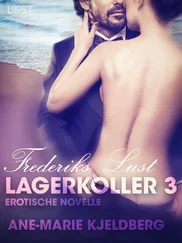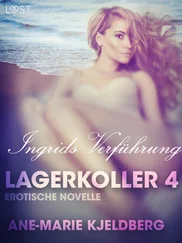“I should have bought stock in Via Rail when I had the chance,” said Duncan. “Your mother’s got customer service whipped into shape and, if you’ll notice, our train arrived on time.”
“Yeah.” Mary Rose smiled. “Only Hitler and Mussolini were able to do that.”
He laughed.
“ ‘Puddle Duddle Rain Wear,’ ” said Dolly. “Look, Mary Rose, will I buy you a pair of rubber boots?”
In the shop window were boots with dots, boots with stripes, boots with triangles and zigzags that looked like the scintillations she used to see prior to panic attacks. She looked away. “That’s okay, Mum, I’m pretty much fixed for boots.”
“Not for you, for the kids, oh, look at the ladybugs!” Dolly stopped in her tracks.
“Maggie already has rubber boots,” said killjoy Mary Rose. “Boots!” cried Maggie, reaching toward the ladybugs in the window. Dolly leaned down, eyes wide, clapping and chanting, “ ‘Ladybug ladybug fly away home! Your house is on fire, your children at home!” ’
“Adybug adybug!” Maggie drummed her heels wildly.
Duncan steered the stroller into the store, Dolly followed, still chanting.
Mary Rose stayed outside and watched them hunt for the right size. Watched Maggie patiently submit to the trying-on process.
Maggie had her legs extended when they came back out, engaged in a staring contest with the big black ladybug eyes.
“We haven’t got anything for Matthew!” cried Dolly.
“It’s okay, Mum, we can shop later.”
“I’ll buy you an outfit, Mary Rose.”
They headed for the sign marked P and an arrow pointing down.
Duncan asked, “How’s big Matt doing, you got him up on skates yet?”
“He’s getting there.”
“No rush. Gordie Howe didn’t own a pair of skates till he was twelve.”
“Although Maggie might play hockey—”
“ ‘Wokking on Wheels,’ ” said Dolly.
“Mum, do you need a snack before we get in the car?”
Duncan said, “Women’s hockey is better than some of the nonsense you see in the NHL nowadays. I remember Gordie Howe’s last game at the Montreal Forum …”
Mary Rose knew this story like the back of her hand, but she also knew her father didn’t talk hockey with her sister, and even A&P wasn’t much of a hockey fan — which, according to some, made him virtually gay. She savoured her position as honorary straight son. “Wow, he went the whole length of the ice like that?” she enthused.
Dolly bobbed between them. “Have you heard from your brother?”
“Not recently,” said Mary Rose.
“Is he still seeing that nice little gal, what’s her name?” asked Duncan.
“Shereen,” said Mary Rose.
“He lives here now,” said Dolly with an air of sudden realization.
Was it just a blood sugar thing? Even Mary Rose had trouble remembering he lived in the same city as she did — not to mention the name of his latest squeeze — did she have early onset? Her mother had always done ten things at once, got hilariously confused, interrupted herself and everyone else. Apart from how much her mother had mellowed — which was a good thing — what was the difference?
Within moments of their arrival home, Mary Rose’s kitchen counter was littered with itty-bitty items that Dolly had deposited like the incoming tide. Packets of jam from the train, half a Tim Hortons doughnut, dollar-store gifts for the kids — lead paints, made in China — a pop-up lint brush/comb, “That’s for you, Mary Rose!” A baby food jar of stewed prunes resembling stool samples, another of candied chickpeas that pass for treats in Lebanon; a bag of Skittles … the visual equivalent of white noise. And amid the debris, some good stuff: Dolly’s homemade baba ghanouj.
“My favourite!” exclaimed Hil, leaning down to hug Dolly.
Along with the Christmas cake.
“I didn’t bake that, my cousin Lena did. She died.”
Hil laughed but stopped short when she realized it wasn’t a joke.
“Really, Mum?”
“Wait now, when did Lena die?” Shouting toward the living room, “Snuggles, when did Lena die?!”
The answer came, adamant if reedy, “Nineteen seventy-four.”
Dolly turned back to them. “Oh, I guess I baked it after all.”
All three of them laughed.
“Your father wants a cup of tea.”
Duncan was in the living room, reading the paper with his eyes closed. Mary Rose dutifully put the kettle on — she’d laid in enough Red Rose to sink an American Revolution — while Dolly opened her purse and came out with a paperback copy of JonKitty McRae: Escape from Otherwhere .
“Did I tell you, we ran into Catherine on the train — was it Catherine or Eileen?” Shouting, “Dunc, was it—”
“It was Catherine,” said Mary Rose.
“She was thrilled when she saw me, she said, ‘You’re Mary Rose MacKinnon’s mother!’ I used to be Abe Mahmoud’s daughter, then I was—”
“Sure, I’ll sign it, Mum.”
She looked in the telephone drawer for a pen, but there was none to be had. How do pens migrate? “Mum, have you got a pen?”
“A pin or a pen?”
“A pen .”
“You don’t have to shout, doll.”
Dolly plunged back into her purse and Mary Rose watched as a bingo ball of objects churned into view; a folded tartan tote bag, plastic pill container stamped with the days of the week, a rosary, a small grey velvet box, half a stick of Wrigley’s Spearmint gum, a brooch—“There’s my CWL pin!”—a one-inch square of plastic that opened to a full-size raincoat, a pair of rolled-up nylon slippers knitted by dead Aunt Sadie, a church pamphlet called Living with Christ , which sounded like Living with Cancer , a pussy-cat change purse … Mary Rose looked away, starting to feel hazy.
“Eureka!” Dolly held up a Best Western pen.
“Is it Catherine with a C ?” she asked, preparing to sign.
“No, this one’s for Phyllis’s granddaughter.”
“What’s her name?”
“Phyllis.”
“The granddaughter’s.”
“That’s right, it’s for her granddaughter.”
“What is Phyllis’s granddaughter’s name?!”
“Linda Kook,” said Dolly.
“Really?”
“Yes. What?”
Hil and Mary Rose were laughing.
“Mary Rose, you’ve heard me talk about the Kooks, I’m in the choir with her mother-in-law, Dorothy Kook, Dotty Kook.”
“Mum, stop.”
“Phyllis has lupus,” added Dolly. “What’s so funny about that?”
“Nothing, I’m sorry, Mum.”
Mary Rose wiped away tears, and signed the book.
“Every time I turn around,” said Dolly. “Last week at choir practice this new little girl”—Mary Rose knew this meant a woman under fifty—“came up to me and said, ‘Are you Mary Rose MacKinnon’s mother?’ ” She raised her hand and began to slice the air. “I used to be Abe Mahmoud’s daughter—”
“Mum, why do you have Skittles?”
“For my diabetes.”
It was not worth going there again. Dolly had type-2 diabetes, Dolly was a nurse. Dolly knew better, but she also knew best.
She went there. “Mum, fruit is what you need, not candy, candy is—”
“ ‘By your children be ye taught!’ ” Dolly pretended to slap her face. “I wish you wouldn’t do that, Mum.”
“Do what, I’ve always done that.”
“No, it’s recent, it makes me feel like you want to hit me.”
“Well, if I did, it would be a love slap.”
“That’s a contradiction in terms.”
“You kids are so sensitive, you’re all MacKinnons!”
Thus the jocular banishment. Mary Rose and her siblings were each subject to it from time to time, stripped of any claim to the Mahmoud side, shorn from their mother. “If your hand offends you, cut it off,” said God. He also said, “Psst, Abraham, take Isaac for a picnic and bring along a knife … Never mind, I was just testing you.” God did go through with killing his son, however. People are always harder on their own kids.
Читать дальше
